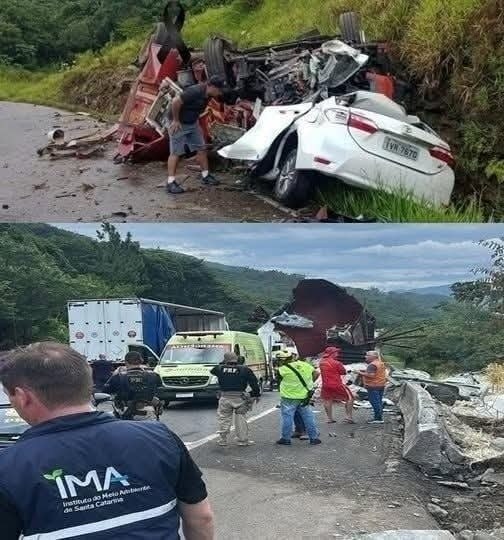By morning, images of the crash spread across Brazil. The wreckage became a sobering reminder of the dangers faced daily by long-distance drivers and travelers. When news confirmed that one of the victims was the well-known singer, tributes poured in from across the country. Fans gathered outside his recording studio, lighting candles and leaving notes. “He sang about hope, love, and simple joys,” said one mourner. “Now those songs will forever carry his spirit.”
Radio stations played his most cherished ballad, “A estrada me chama, mas é o lar que me espera” (“The road calls me, but home is what waits”), as thousands shared their grief online.
Twelve survivors were rushed to hospitals across northern Minas, several in serious condition. Many suffered fractures and burns, but doctors credit the quick response of rescue teams for saving lives. “They survived the crash, but recovery will be long,” said Dr. Luana Reis of the Grão Mogol Regional Hospital. “These are workers and parents — people who left home hoping to return. Their families now face emotional and physical healing that will take months, maybe years.”
Families have gathered outside hospitals, praying for updates and clinging to hope. “He called before leaving,” said one woman through tears. “He promised he’d be home by sunrise.”
Authorities are investigating potential driver fatigue, maintenance issues, and violations of transport laws. Early findings suggest the truck driver may have been on duty for more than twelve consecutive hours — exceeding federal limits. “This is not just an accident; it’s a failure of oversight,” said transportation expert Paulo Mendes. “Lives are being lost because drivers are pushed beyond human limits.”
The BR-251 is known as one of Brazil’s most dangerous highways, notorious for its heavy truck traffic, narrow lanes, and lack of lighting. Despite repeated safety pledges, little progress has been made in recent years.
Communities across Minas Gerais and Ceará held candlelight vigils for the nine lives lost. The singer’s funeral drew thousands, including fellow musicians and fans. One of his bandmates placed a guitar pick beside his coffin and whispered, “He believed music could heal — maybe now it can heal us, too.”
Local residents and advocacy groups are demanding stronger highway safety measures, including mandatory rest stops, improved lighting, and stricter enforcement of driver-hour laws.
In the aftermath, the Ministry of Infrastructure announced plans to evaluate safety conditions on BR-251 and expand patrol presence to prevent further tragedies. For many, these steps come too late — but they still represent a glimmer of hope for safer roads ahead.
Across Brazil, messages of solidarity continue to flood social media. The singer’s legacy lives on — not just through his music, but through the calls for change inspired by his untimely loss.
Nine lives gone, countless hearts broken — but their memory reminds us that every journey deserves a safe return.
What do you think needs to change to make Brazil’s highways safer? Share your thoughts and join the conversation below.

